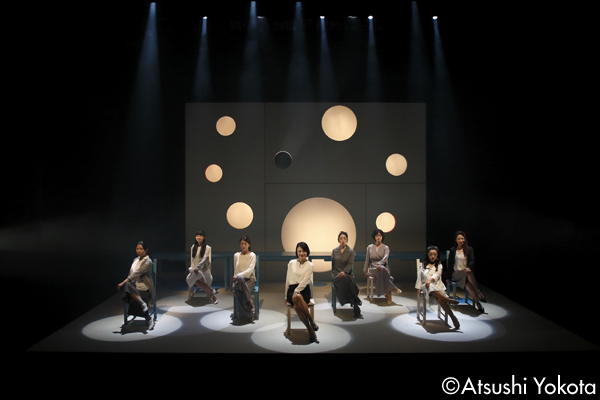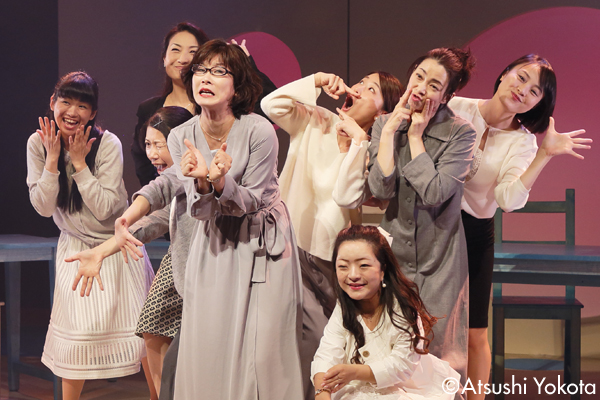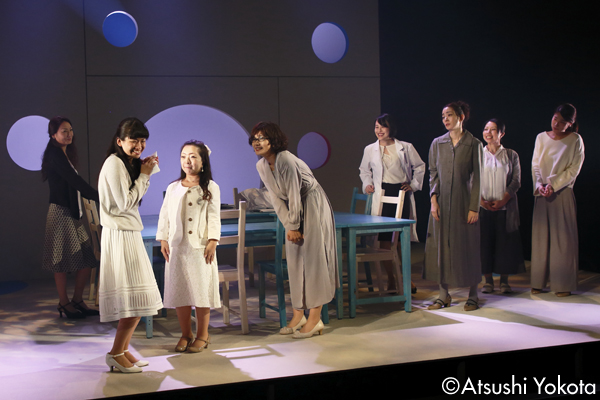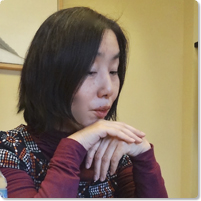Prologue
The eight women in this play begin to talk about their individual experiences of their first menstruation, after the preface is stated that a girl menstruating at the age of 12 and reaches menopause at the age of 50, women who don’t go through childbirth have roughly 39 years of menstruation in their lives. For Sonoko Tsuwa, her first menstruation came at the age of 12 and her mother congratulated her. Despite normally acting older than her age, Kyoko Kawato didn’t begin menstruating until she was in middle school. Yumi Konno remembers how she had trouble confessing it to her mother. Kanako Doi remembers that her first menstrual discharge when she was walking home from school with her friend Fumi. Sayaka Sugimoto was being treated with growth hormone when she was at that age. Akemi Tabo was raised by her grandmother. Eika Shida was frequently teased by the boys. And menstruation never came to Rio Shimamura.
The setting is the sanitary napkin development lab of Anemone Corporation in 2017. Doi, the development team sub-leader, says that the more she uses high-function napkins the worst her physical condition gets, and she tell the new-product development team leader, Tsuwa, that they should develop a napkin that uses natural materials.
During the play, some “Anne Girls” make appearances time and again to explain various things such as the differences in the materials used in the napkins, their construction and absorption rate, etc.
The planning division chief, Kawato comes to the development lab and advises the two that they should propose Doi’s plan at the “Free Research for Adults” think-group meeting that is being help under a grant from within the company. Then she invites them to join her for dinner.
The Anne Girls give a presentation of the fundamental facts of menstruation. They ask the audience to understand menstruation and display their opinions on placards.
The scene is a bar near the company. Having drinks together are Tsuwa and Doi and Tabo, who entered the company at the same time, and the researchers Shida and Konno who Kawato has invited, and also a junior in the Planning Division, Sugimoto, has joined as well. Tsuwa says she wants to show the men what they can do by creating a successful high-function napkin from a woman’ s perspective and with female researchers. Konno says that rather than developing a high-function napkin like the competition, there is a better chance of success if the napkin for women oriented toward natural, eco-friendly products.
Tsuwa reflects back on the past. She recalls things like her dedication to her work and breaking up with her boyfriend. She arrives at the conclusion that her irritability was due to premenstrual syndrome (PMS), and she sends an email to the team members saying that she agrees with the idea of the natural-material product plan.
At the “Free Research for Adults” meeting the natural concept product plan is adopted. If their presentation three months from now wins, the product can be launched. At the first team meeting, Shimamura from the General Affairs department comes in to say that she wants to participate in the research. Having gender dysphoria, Shimamura underwent a sex-change operation to become a woman after entering the company. The team is rather cautions about how to respond to Shimamura’s request. To test her aptitude, Sugimoto suggests that she submit a report about a natural-material napkin potential.
Konno reflects on her past. Bearing the trauma growing up with a mother she couldn’t get along with to the point that she despised her own gender, she contemplates anew why she ended up working on the development menstrual products.
The Anne Girls introduce the world ranking for the position of women in society, and they talk about sexual discrimination among Japanese men.
After submitting an excellent report, Shimamura is accepted onto the development team. As the natural-material product group’s research into raw materials progresses, a number of social issues come to the surface.
Doi reflects on the past. She talks about the death of her close friend Fumi of uterine cancer because she failed to recognize the symptoms in time due to chronic menstrual pain.
Shida, Sugimoto and Shimamura are in a meeting. Amid talk about the difficulties of creating a completely non-chemical product, they begin to talk about their own personal lives and sexuality. Shimamura talks about her attachment to her new post-operation [female] body, while Sugimoto talks about here complex after being treated with growth hormone because of her growth, and Shida talks about how she first came to know her husband, who is a scientist like herself.
Tabo, Kawato, Konno are in a meeting. While discussing the breathability of materials, Kawato begins to talk about her own experiences of the changes that menopause brought in her body.
Tabo reflects on living with her retired father and her grandmother, whose dementia is progressing. This connects to feelings about her marriage and giving birth to a child.
A meeting with the entire team attending. In response to the growing evidence that it will be difficult to commercialize their product without using a chemical material for the absorbent layer, Doi counters that the whole project will be meaningless if they compromise on that point. Filled with emotion by Doi’s wish to create a safe napkin that she can give to her deceased friend Fumi’s daughter, Tsuwa suggests that they submit a no-compromise plan for a completely non-chemical product.
Shimamura’s recollections. Her work on sanitary napkins had begun shortly after her sex-change operation and starting her new life as a woman. She talks about her strong emotions when she first tried the newly completed product at Sugimoto’s suggestion.
The natural-material turns out to be received with high acclaim, but its adoption measure is defeated by another proposal to establish a child-care nursery within the company. But, Tsuwa declares to her team that she will official start a new project to develop a natural-material product.
Shimamura and Sugimoto remain in the meeting room. To Shimamura, Sugimoto says, “I might have gotten to like you when you were still a man.” When Shimamura asks if love between them as women wasn’t possible, Sugimoto smiles and replies, “Let’s begin by being friends.”
Kawato gives praise to her juniors on the team. This final scene then gives way to the narration of the Prologue.





